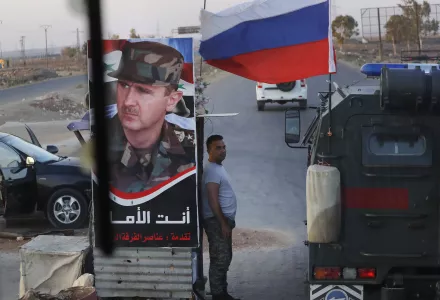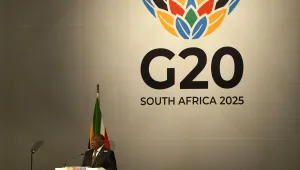
Fall of Assad: Aligned interests
The fall of the Syrian regime has raised a lot of hope, but at the same time a lot of fears about the future of the country and the region. Even though no one expected this scenario, it was obvious that the Assad regime had reached a standstill, whereby staying in power was its main fixation, at the expense of its own people. The Russian and Iranian cover could not hold out for too long. Moreover, no cover from outside powers is strong enough to sustain a president when hundreds of thousands of his own population have been killed, displaced, and exiled. Bashar Assad, unlike Ben Ali, Mubarak, or Ghedaffi, who left in 2011, had a chance to improve conditions during the past ten years, but he did not seize it. There was not enough search for compromise or openness, but instead a permanent stubbornness for power. To avoid more chaos in the region, neighboring countries even helped him by trying to buy him more time, but nothing helped. More recently, the regime became too much to bear for the Russian and Iranian sponsors, bogged down and weakened by the war in Ukraine and the Israeli strikes respectively. The regime was suffocating for the Syrian population and a source of instability for Turkey, Israel and other countries in the region. We had come to a point where his departure could not be worse than his continuation, and therefore no one today regrets Assad’s departure.
Still, many uncertainties arise about the future. Will this change be a great opportunity or will it be the opening of the Pandora's box for more chaos in Syria and the region and yet another tragedy as is often the case in this part of the world? In my opinion, this will depend on two essential factors. First, the behavior of the country's new masters, HTS, a group classified as a terrorist organization and a former branch of Al-Qaeda in Syria. Secondly, the future of Syria will be played out at the regional level, where Syria is at the center of divergent interests of many neighboring countries.
HTS ‘Post Jihadists’ and the temptation of Islamic power
The Syrians did not elect HTS to lead the country or give any electoral mandate. HTS must understand with great humility that this victory is not only theirs, but also that of the Syrian people in all its components who have sacrificed themselves for so many years to reach this day. It was the self-collapse and dislocation of the Assad regime that caused its downfall more than a military confrontation that could have completed all the capabilities of the state. Secondly, carrying out a media makeover will not allow HTS to forget its past as extremist Islamist fighters who belonged to Al-Qaeda, especially since the momentum is no longer favorable to Islamist movements as it was in 2011 after the Arab Spring, from which they should draw a lot of lessons so as not to repeat the same mistakes. This is a huge task for HTS; and would it be a mischievous act of history to see a Salafist Islamist group take up this challenge and not the Muslim Brotherhood, the self-proclaimed heralds of Islamism's compatibility with governing a modern state? HTS must also be aware that it will be carefully observed on all its choices related to public and private life, in particular, individual freedoms, the status of women, and respect for minorities. In this crucial phase, HTS's main mission should stop at securing the country, managing a very rapid transitional phase and, above all, giving a clear political direction to unite the country. Certainly, the archipelago of armed groups in Syria, many of which are related to global terrorism, does not facilitate the task and imposes a rapid demilitarization of all armed groups. Moreover, the self-dissolution of these groups, including HTS, would be a pledge of confidence for the Syrians and for the international community.
During these first months, HTS must not sink into the temptations of day-to-day governance. Governing Syria is on orders of magnitude much greater than the management of Idlib. Instead, the objective of this phase is to create the framework for a rapid peaceful transition that would lead to inclusive elections and legitimate institutions by law. The ability of HTS and the various Syrian components to establish an inclusive system that would guarantee the peaceful coexistence of all confessional and ethnic components will be the sine qua non condition for a safe exit of the current transitional period. Electing a Constituent Assembly to draft a new constitution in the short term, like we did in Tunisia, is unnecessary, in my opinion. The nation will lose momentum and focus, and it will take a long time, especially since more social and economic demands from the population will soon surface. An expert committee can be sufficient, during this phase, to quickly build a legal consensus upon Syria's long constitutional tradition, which includes constitutions that were examples of coexistence between confessions. Moreover, the long history and that of the Arab Spring has taught us that the key to the success of a political transition is, not only in the texts, but above all in the shared conviction of the various actors – and belligerents – that their survival and their interests lie in coexistence. The behavior of these political actors will be crucial.
Post-Assad: Non-Aligned Regional Interests
The second level that will guide the turn of events is not only undoubtedly the behavior of regional players, but also of the main world powers. Since the Syrian revolution turned into a proxy war, the country has become an open stage for foreign interference. Its geographical location and positioning ensure that the events that take place there exert a reciprocal influence on neighboring countries. The scenario of the establishment of an extremist Islamist regime could revive the appetite of the Muslim Brotherhood in Egypt and Jordan and brings them back to power even if this risk is a little overestimated. Israel can also be threatened with a new front and future normalization plans will struggle to see the light. Iran has suffered a major setback losing in the process an ally and its corridor to Hezbollah. Turkey, for its part, appears to be the principal winner and remain very involved and will closely watch HTS and the Kurdish groups operating in Syria, which it accuses of terrorism. However, a prolonged destabilization of Syria against a backdrop of armed group fighting, similar to what happened in Libya after 2011, could end up destabilizing Turkey. This being said, the mistake for the international community is exactly to wait and just consider this major event from the angle of winners and losers. The divergent interests of regional players certainly means that, in the short term, each country will be tempted to impose the scenario that suits its own interests. However, it seems that all these scenarios will lead to more destabilization for the entire region in the medium term, and the collateral effects will ultimately affect the entire region. Not to mention that some will deliberately push towards the chaos of the region. Finally, the scenario of a partition of Syria between Sunni, Alawite and Kurdish factions cannot be ruled out, and the reverberations of such a scenario could be dangerous for all the countries of the region.
It is obvious, therefore, that the wait and see strategy will not result in a durable transition. The international community must act together, led by the US and the EU, to support the Syrian people and help them succeed in this transition given the importance of Syria for the whole region. Western powers must not interfere in the choices of Syrians, but it is out of the question to give HTS a blank check. The goal is to achieve the objectives mentioned above for the interest of the Syrian people. Similarly, the temptations of neighboring countries to act unilaterally should be controlled by major powers to avoid further complicated situations on the ground. In economic terms, emergency funds should be immediately deployed to help the displaced and struggling Syrian population. The sanctions must be removed as they were against a regime that is no longer in place. Given the complexity of the regional situation and the new leaders in Damascus, the equation may seem difficult and rather doomed to fail, but the stakes and consequences can be so enormous that Western diplomacy should not waste a minute trying to find a way out. The accompaniment during the first months is crucial for a successful transition and another lesson from the Arab spring. Without this, things can take a turn for the worse in the region.
Statements and views expressed in this commentary are solely those of the authors and do not imply endorsement by Harvard University, the Harvard Kennedy School, or the Belfer Center for Science and International Affairs.
Chahed, Youssef. “Syria, The Day After.” Belfer Center for Science and International Affairs, January 2, 2025



